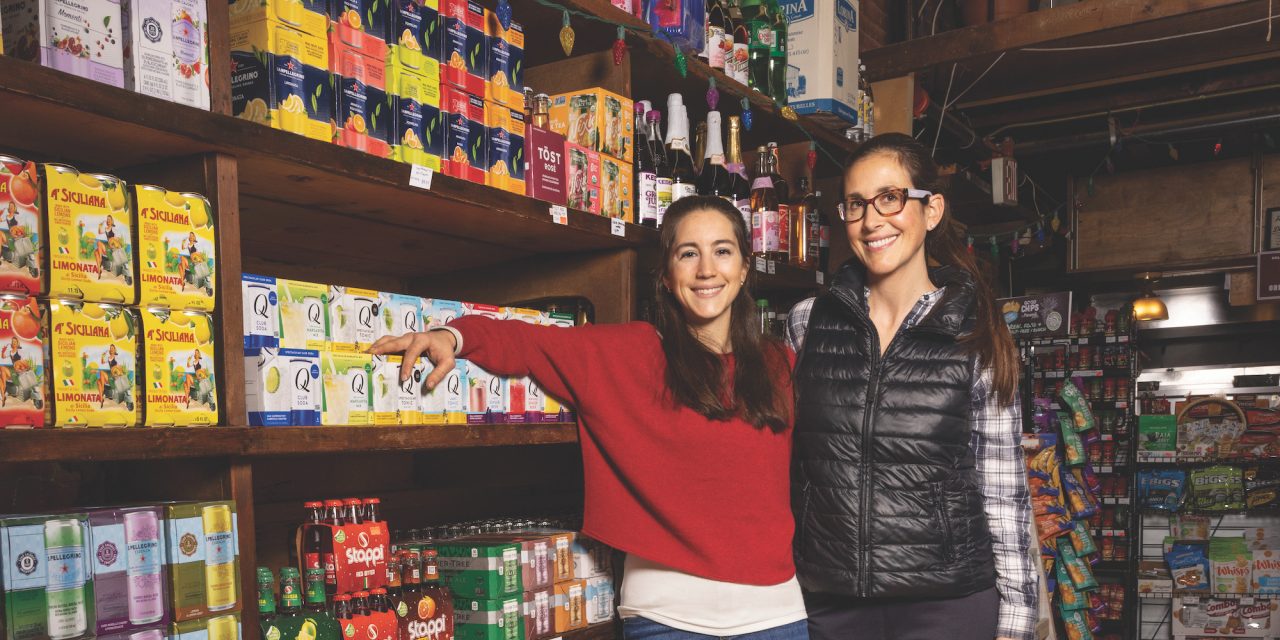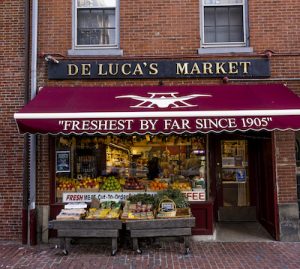
A Fresh Start for a Family Business

Victoria Aiello ’08 and Caroline Aiello ’98, the new owners of DeLuca’s, feel a deep connection to the Beacon Hill grocery store, which has been in the family for almost a century.
Story by Sarah Abrams
Photographs by Alex Gagne
When the Sicilian-born Joseph DeLuca took over ownership of the Charles Street fruit and grocery store, in the 1930s, a gallon of milk cost about 32 cents and a loaf of bread 6 cents. Almost 100 years later, his great-nieces, Caroline Aiello ’98 and Victoria Aiello ’08, the market’s new owners, stand poised both to continue the grocery’s legacy as a mainstay in the neighborhood and to usher in a new era in a vastly changed world.
“We wanted this to have our families’ influence and stamp on it,” Victoria says, “but to also be our thing—a fresh generation and a fresh start for DeLuca’s—which I think every business inevitably needs.”
The idea of running the family business—a role passed on from one generation to the next, from their great-uncle to their grandparents to their father and uncles—was some- thing, Caroline says, that has been simmering in the back of her mind since childhood. “For me, the store was always a source of such pride. It was an extension of myself. At Milton, I would always bring cannoli makings to share at the multicultural fair.” In French class one day, she recalls, her teacher was surprised when, during a class discussion on professions, she proudly shared that her father was a grocer. “He wasn’t sure how to respond,” she says.
The affection the sisters feel for each other and the ease with which they interact is palpable as they discuss their new venture. Caroline is quick to praise Victoria’s athletic abilities, noting that her sister played competitive tennis at both Milton and Middlebury College, from which she graduated in 2012. “Victoria is an amazing athlete,” says Caroline. And Victoria credits Caroline, an attorney who practiced international trade law for several years at Steptoe & Johnson, in Washington, D.C., with helping make the transfer in ownership smooth.
They began thinking seriously about joining forces, Victoria recalls, when Caroline visited her in Argentina during her junior year abroad. “The first time I remember it really entering the conversation was 2010 or 2011,” she says. “We would go to all these fabulous places and we’d say, ‘Oh, yeah, this could be DeLuca’s.’”
 They always knew, however, that taking over the family business would not be a glamorous endeavor. “It’s a penny-margin business,” Caroline says. “We knew that going in. It’s a service business. It’s about continuing an important role in the community. Running a retail business—especially food—you’re serving the neighborhood; you’re serving your staff; but we also aim to be a must-visit spot for visitors to Boston.”
They always knew, however, that taking over the family business would not be a glamorous endeavor. “It’s a penny-margin business,” Caroline says. “We knew that going in. It’s a service business. It’s about continuing an important role in the community. Running a retail business—especially food—you’re serving the neighborhood; you’re serving your staff; but we also aim to be a must-visit spot for visitors to Boston.”
The sisters plan to continue offering the high-end, specialty products from Italy—oils, cheeses, spices, and candies—that DeLuca’s is known for, but also to expand the store’s selection to include foods from around the world and to support women-owned and start-up businesses that are flourishing. “We’re really excited about having the opportunity to introduce all sorts of different foods—from ice creams and baked goods to healthy veggie chips and chocolates,” Caroline says.
And everything must be of the highest quality. “We want to provide the best possible experience for our customers,” Victoria says. “We want to be really intentional and conscious about what we carry. Whatever type of food it is or where it’s from, it will be of amazing quality and, when possible, ethically and sustainably sourced.”
Meats will come from farms where the animals have been treated humanely. The sisters are looking at farms throughout New England. “We won’t buy from farms that take part in inhumane practices,” Caroline says. Produce will be sourced from local farms whenever possible, and they plan to phase out products that are overly reliant on plastics.
Plans are also underway to significantly expand the deli and prepared food sections. “Offering prepared foods that customers can take home and put on the table is the way we’re going to survive,” says Caroline. “In this new grocery climate, where people are buying online and can get everything delivered to their door, DeLuca’s will offer customers that human touch and also a really cool experience.”
Neighborhood customers are starting to notice the changes they are making, the sisters say. Shelves featuring a wide range of products—sauces, seasonings, and spices from around the world—are giving them a chance to prepare authentic international dishes properly, says Victoria. “Most recently, our younger customers have been excited to find ingredients to make the tinned fish board that’s a TikTok trend now. Our older clients, meanwhile, have been enjoying this selection for years. It’s so rewarding to hear folks say, ‘Oh, look, they have this, this, and this.’”
Most of the products that have appeared on DeLuca’s shelves through the decades will continue to be offered. “There are a lot of folks who live in the neighborhood who are getting up in age and don’t have the mobility to go to Whole Foods, which is a 15-minute walk away,” says Caroline, “but they can come here. So we still stock their kind of tea and other specific things they want, like the Cream of Wheat that they are disappointed not to find.” “Or the saltless Saltine crackers,” Victoria adds. “It makes us really happy to do that,” says Caroline.
Although their parents never pressured them to take over the business, the sisters say, their father and mother, the artist Candace Jans, are delighted that they have decided to do so.
“They didn’t want to make us feel like we had to do this,” Caroline says. “They know how hard it is and they know the sacrifices you have to make.” Victoria adds, “But they’re happy we’ve decided to do it.”
Caroline already detects that same pride she feels for the family business in her two sons, eight-year-old Nick and six-year-old Geo. Nick enjoys stocking the shelves, Caroline says. Both attend school nearby and often stop in with their teachers and classmates to shop. “They’re so proud. They say, ‘Mom we’re going to run DeLuca’s someday when you’re done working.’”
The legacy goes on.




